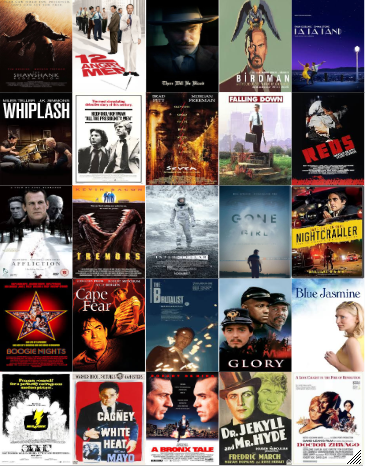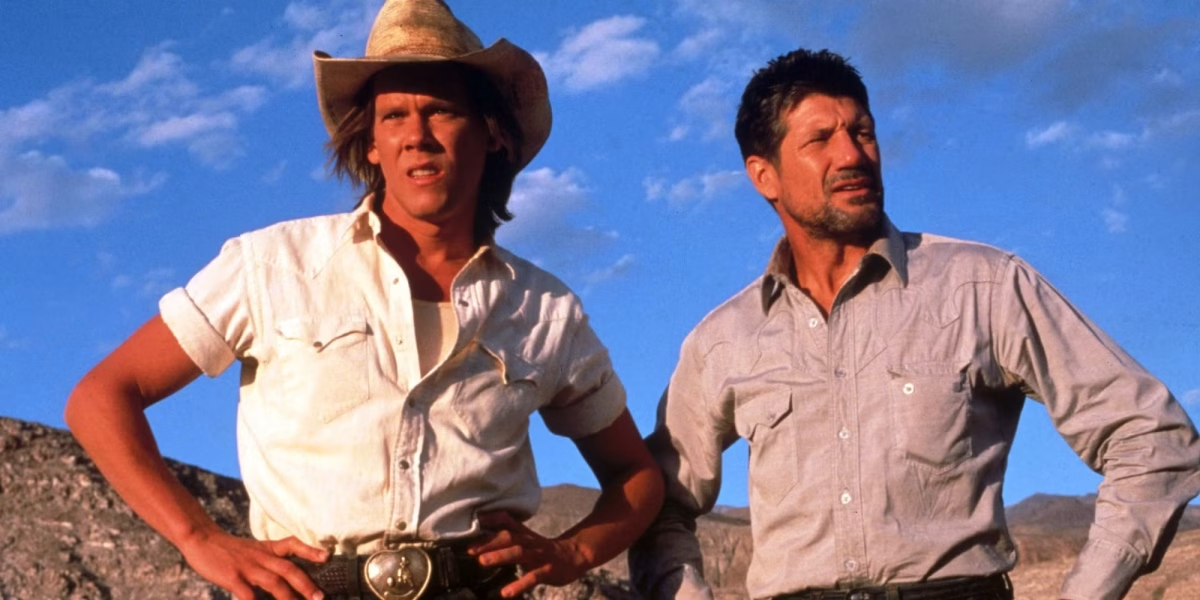Southern Inhospitality: the Tenth Democratic Debate
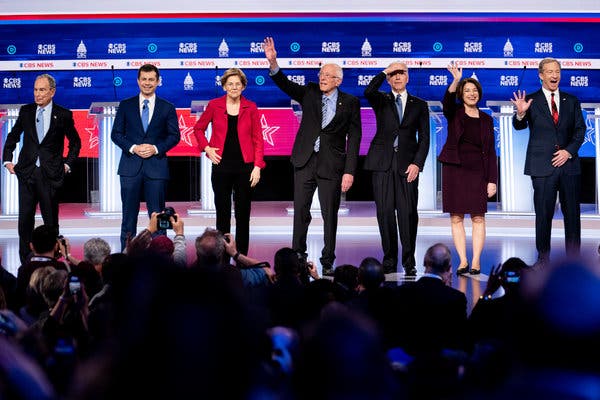
With the race for the Democratic nomination turning to crunch time as the South Carolina primary approaches and Super Tuesday looms, the candidates turned in feisty performances, frequently interrupting each other in the face of helpless moderators and an unfriendly audience. Pictured left to right: Michael Bloomberg, Pete Buttigieg, Elizabeth Warren, Bernie Sanders, Joe Biden, Amy Klobuchar, and Tom Steyer. Photo credits: Erin Schaff/The New York Times.
CHARLESTON, SOUTH CAROLINA—After three primary elections and nine debates on mostly familiar ground, the Democratic Party is finally off home turf as the race to the primary nomination shifts to ruby-red South Carolina. The tenth debate, hosted at the Gaillard Center Center in Charleston by CBS News and the Congressional Black Caucus on Tuesday, February 25, featured unprecedented hostility between not only the candidates, but also the moderators and even the audience. The candidates peevishly interrupted each other after the moderators proved unable to restrain them in the first half, before settling into mutinous muttering after the moderators ramped up their own aggression in enforcing time limits, while boos and jeers resounded from the live attendees.
Each of the candidates was desperate to seize the spotlight, aware of what was at stake. The mounting tension comes barely a week from Super Tuesday, the biggest delegate haul in the season. While usually at this time the race consolidates to two or three candidates, this year the field still remains historically divided, with still seven candidates qualifying: Michael Bloomberg, Pete Buttigieg, Elizabeth Warren, Bernie Sanders, Joe Biden, Amy Klobuchar, and Tom Steyer. Of the remaining declared candidates, only Tulsi Gabbard—the only person of color still in the race—failed to qualify.
The clear frontrunner, however, remains Vermont Senator Bernie Sanders, the runner-up in the 2016 primary and standard-bearer of the party’s progressive wing. Having won the popular vote in three straight primaries in Iowa, New Hampshire, and Nevada by increasingly convincing margins, Sanders has surged in national polling and is poised to rack up further wins on Super Tuesday, especially the ultimate prize of California, with its treasure trove of 415 delegates. Pundits have speculated that the race could be more or less over by then, with Sanders the presumptive nominee. That, however, put him in the crosshairs of every other campaign, as they all seemed to have made the exact same calculation: the only way to win was to hammer him as hard as possible.
Sanders the Punching Bag
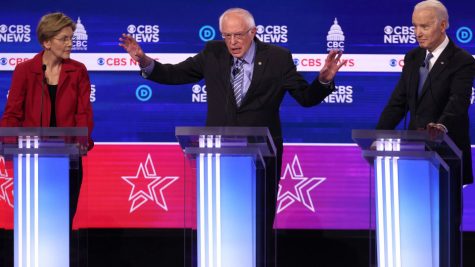
Throughout the debate, Sanders was relentlessly hounded by his fellow candidates on a wide variety of issues. From the very first question, former New York Mayor Michael Bloomberg attacked him over alleged ties to the Russian government, claiming that “Vladimir Putin thinks that Donald Trump should be president of the United States, and that’s why Russia is helping you get elected.” Barely had Sanders batted back that blow when his longtime ally and fellow progressive Massachusetts Senator Elizabeth Warren sounded another attack, this time over Sanders’s approach to policy. She clarified that “Bernie and I both want to see universal health care, but Bernie’s plan doesn’t explain how to get there, doesn’t show how we’re going to get enough allies into it, and doesn’t show enough about how we’re going to pay for it. I dug in. I did the work. And then Bernie’s team trashed me for it.”
Former South Bend, Indiana Mayor Pete Buttigieg swiftly followed, “Imagine spending the better part of 2020 with Bernie Sanders vs. Donald Trump,” drawing laughs from the audience before continuing that “there’s a majority of the American people who I think right now just want to be able to turn on the TV, see their president, and actually feel their blood pressure go down a little bit, instead of up through the roof.” Billionaire Tom Steyer criticized Sanders’s solutions, stressing that “I don’t believe that a government takeover of large parts of the economy makes any sense for working people or for families.”
Former Vice President Biden concluded the whirlwind of attacks by bringing up Sanders’s past history of opposing gun reform in the context of the Charleston church shooting of 2015, reminding the audience that within “walking distance of here is Mother Emanuel Church, [where] nine people [were] shot dead by a white supremacist. Bernie voted five times against the Brady Bill and wanted a waiting period of 12 hours. I’m not saying he’s responsible for the nine deaths, but that man would not have been able to get that weapon with the waiting period had been what I suggest until you are cleared.” He finished by bringing up how Sanders had “said we should primary Barack Obama…and [that] the president was weak and our administration was in fact not up to it.”
Sanders brushed them off with a quip—“I’m hearing my name mentioned a little bit tonight”—but it was a pattern that would continue to manifest itself throughout the night. Candidates dogpiled on Sanders, criticizing him from multiple angles of attack as the moderators haplessly tried to restrain the crosstalk. Warren criticized him for supporting the filibuster, which would enable the Republicans to block any legislation even in the face of a Democratic majority. Confusingly, Biden claimed that “150 million people have been killed since 2007 when Bernie voted to exempt the gun manufacturers from liability.”
Foreign Policy Takes Center Stage

One of the most extended episodes came in the second half of the debate, when Sanders was extensively criticized for his foreign policy views, especially regarding left-wing nations like China, Nicaragua, and Cuba. The previous weekend, on “60 Minutes,” Sanders had praised the Castro regime’s literacy programs, and he reiterated that defense onstage, saying, “What I said is what Barack Obama said in terms of Cuba, that Cuba made progress on education.” The crowd began loudly booing his statement upon these words, and a visibly agitated Sanders snapped, “Really? Really? Literacy programs are bad?”
Sanders went on to stress that “occasionally it might be a good idea to be honest about American foreign policy, and that includes the fact that America has overthrown governments all over the world in Chile, in Guatemala, in Iran. When dictatorships, whether it is the Chinese or the Cubans do something good, you acknowledge that. But you don’t have to trade love letters with them.” Pressed by Biden and Buttigieg, he further clarified that “Cuba, Nicaragua, authoritarianism of any stripe is bad,” before the conversation once again collapsed into crosstalk and the moderators wrestled for control.
The one time the candidates all seemed to be in consensus was in regard to the coronavirus issue, which has intensified in recent days as the number of cases outside China continues to mount. Minnesota Senator Amy Klobuchar spoke for the whole field when she stressed the importance of taking the issue “out of politics right now… because this is so serious. I’m not going to give my website right now. I’m going to give the CDC’s website, which is cdc.gov., so that people keep checking in and they follow the rules and they realize what they have to do if they feel sick and they call their health care provider.”
Throughout the debate, Klobuchar and Buttigieg largely ignored one another, choosing not to restart their damaging duel from last week over experience. Instead, they both played up the moderate message of unity, especially criticizing Sanders for his costly Medicare plan. Amy Klobuchar slammed him for his unwillingness to provide details, saying that “The math does not add up”. Buttigieg added that Sanders would doom down-ballot Democrats in swing Senate and House races, saying that “It adds to four more years of Donald Trump, Kevin McCarthy as speaker of the House, and the inability to get the Senate into Democratic hands.”
Warren vs. Bloomberg, Round Two
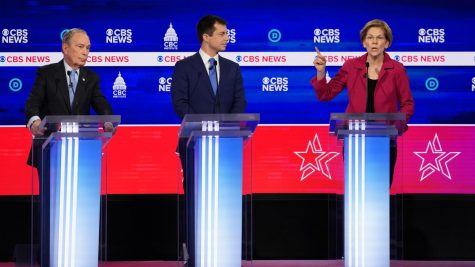
Aside from the stagewide skewering of Sanders, the most venom was thrown between Warren and Bloomberg. Far from the uneasy truce between Klobuchar and Buttigieg, the two instead reignited their feud from last week, where Warren repeatedly criticized Bloomberg for a variety of issues, especially his company’s policy of enforcing non-disclosure agreements against female employees complaining of misconduct from Bloomberg. She took another angle of attack at the tenth debate, reminding the audience that Bloomberg had funded the campaign of South Carolina’s deeply unpopular senator, Lindsey Graham, as well as supporting Republican Senators Pat Toomey of Pennsylvania and Scott Brown of Massachusetts, the latter of which Warren ended up defeating herself.
With trademark indifference, Bloomberg dismissed her attacks as focusing on “sideshows” and stressed that “I have been training for this job since I stepped on the pile that was still smoldering on 9/11.” Warren shot back that “this is personal for me. When I was 21 years old, I got my first job as a special education teacher. I loved that job. And by the end of the first year, I was visibly pregnant. The principal wished me luck and gave my job to someone else…At least I didn’t have a boss who said to me, ‘Kill it,’ the way that Mayor Bloomberg is alleged to have said to one of his pregnant employees.”
Bloomberg flatly denied it. “I never said it, period, end of story. Categorically never said it. When it was accused—when I was accused of doing it, we couldn’t figure out what she was talking about.” He pointed out he had released three women from nondisclosure agreements, throwing in a cutting aside: “the trouble is with this senator, enough is never enough…We just cannot continue to re-litigate this every time.” As Buttigieg cut in with another interruption that “If you get nominated, we’ll be re-litigating this all year,” the moderators once again had to forcefully steer the candidates away.
Biden Resurrected
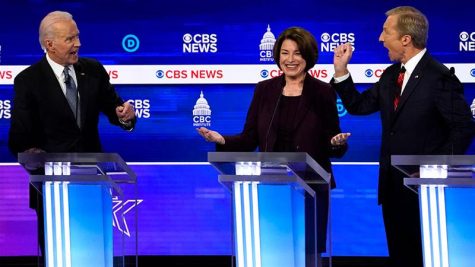
A third notable exchange was when Biden trained his fire on Steyer, who has eaten into Biden’s base of support among African Americans by blanketing South Carolina with advertisements in hopes of a longshot victory. Biden incisively cut into Steyer’s record as hedge fund manager, when he “bought a…private prison system [where] they hog-tied young men in prison here in this state…[and] in Georgia, they did not have health care for the people who were being held.” Seemingly frantic, Steyer tried to defend himself, protesting that “I bought stock in a prison company thinking they would do a better job. And I investigated. And I sold it…since then, I have worked to end the use of private prisons in my home state, and we have ended it.”
Steyer continued by asserting that he had “started a bank to support black ownership of businesses, women ownership of businesses, and Latino owners of businesses.” Biden, however, finished with a caustic backhanded comment: “Where we come from, that’s called Tommy come lately.” It was a marked difference in the otherwise gentlemanly Biden, who had often been panned for mediocre, low-energy performances in past debates. While other candidates interrupted and went over time, prompting blowback from the moderators, Biden repeatedly conceded his speaking time, even frustratedly remarking “why am I stopping? No one else stops. It’s my Catholic school training.”
Biden and his fellow candidates were vindicated, however, after considerable criticism was directed at the CBS correspondents in the following days for their poor moderating, often leaping between unrelated topics, becoming unnecessarily rude and aggressive in the second half in order to “overcompensate” for a failure to keep control in the first half, and asking juvenile questions. The final question of the night was “the biggest misconception about you” and “what is your personal motto”, which was widely ridiculed as being unhelpful and unnecessary; many of the candidates chose simply to make jokes about their hair or their height. Warren and Buttigieg quoted scripture as their mottos, while Bloomberg simply quoted himself that “I’ve trained for this job for a long time and when I get it I’m going to do something rather than just talk about it”.
To make matters worse, right afterwards moderator Norah O’Donnell gave the customary “that concludes our debate”, her fellow moderator Gayle King contradicted her with a confusing cut to commercial break. Ironically, one of the commercials was a Bloomberg advertisement, highlighting the power of his bottomless campaign funding from his net worth of $64 billion. The debate resumed only for O’Donnell to once again state “that concludes our debate”, leaving viewers confused and angry that they had been tricked into thinking there were still more questions.
Conclusion
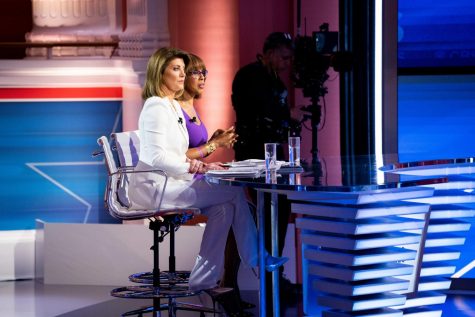
Overall, however, the debate was a much-needed jolt of energy for Biden, who sagged in the first two primaries and turned in a distant and disappointing second place in Nevada. South Carolina remains his best shot at halting Sanders’s momentum, having long been described as his “firewall”, and after the influential House Majority Whip Jim Clyburn’s endorsement Wednesday morning he stands poised to snag a victory out of the jaws of defeat. However, it also failed to effectively blunt Sanders’s momentum going forward into Super Tuesday, with candidate able to leave lasting scars on the frontrunner. The nail-biting anxiety of the Democratic primary now enters its most intense stage: the looming threat of a contested convention where Sanders has the most delegates, but the other candidates combined can override him. In summary: if you thought 2016 was bad, get ready for 2020 to be even worse.

Vincent Jiang is currently a senior at West Morris Central High School and President of Journalism Club. Passionate about global affairs, he enjoys writing...





















